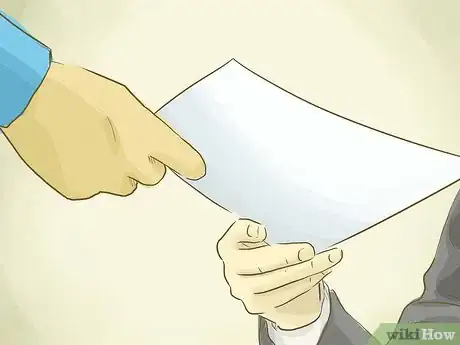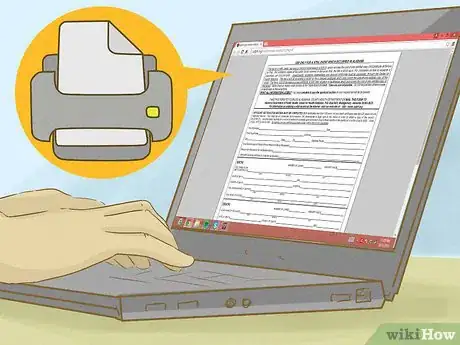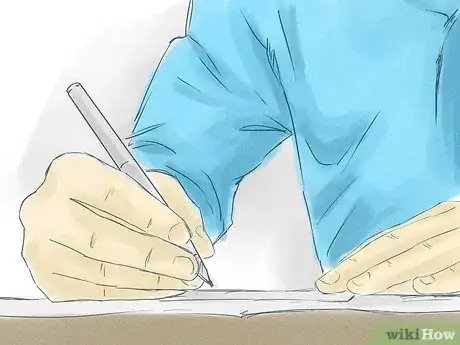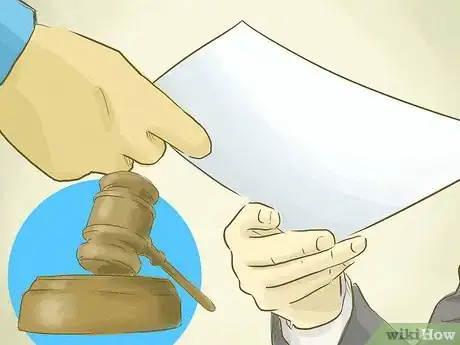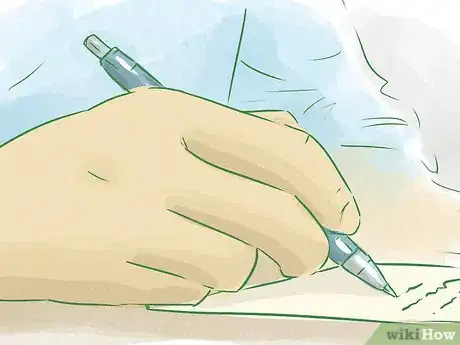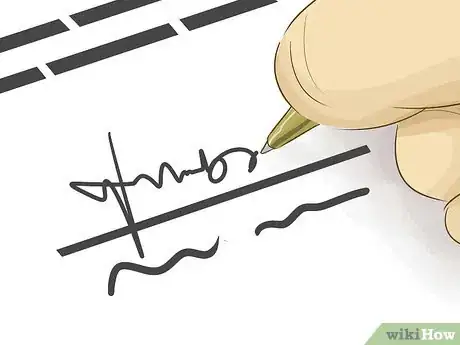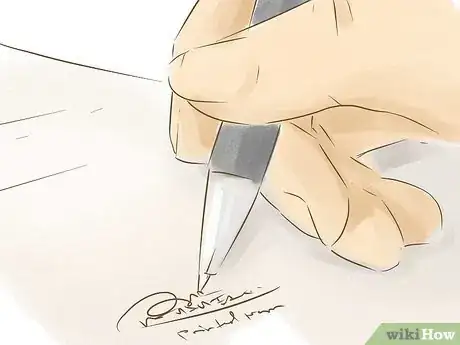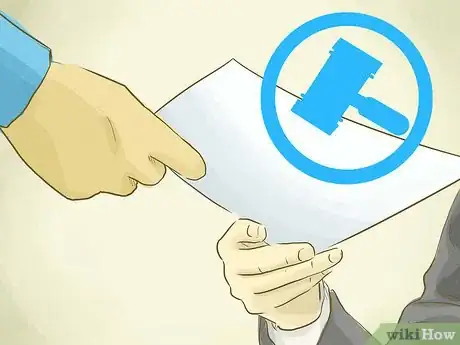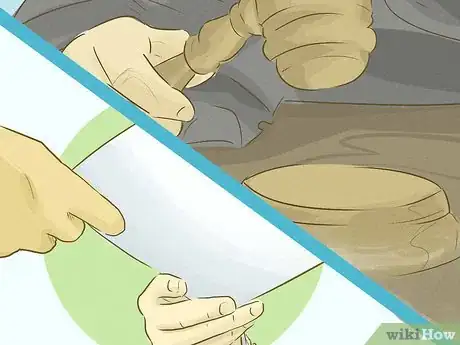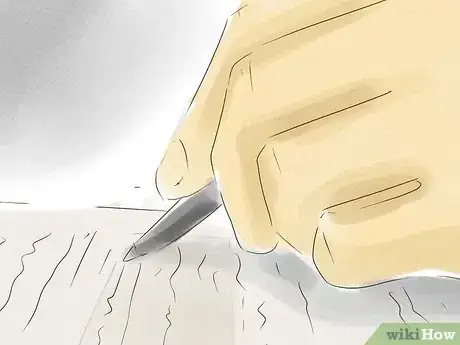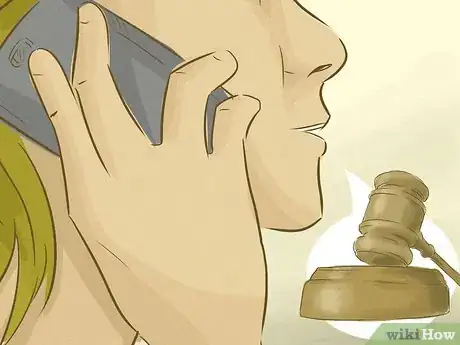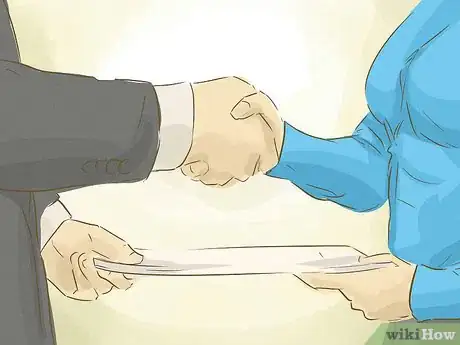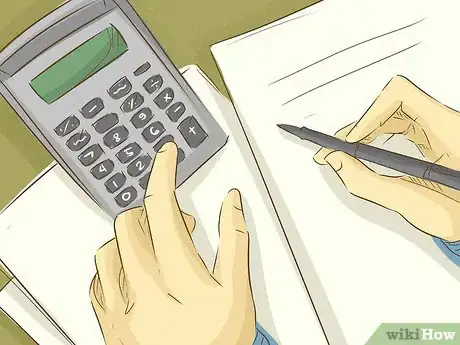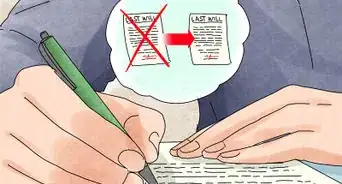This article was co-authored by Clinton M. Sandvick, JD, PhD. Clinton M. Sandvick worked as a civil litigator in California for over 7 years. He received his JD from the University of Wisconsin-Madison in 1998 and his PhD in American History from the University of Oregon in 2013.
There are 10 references cited in this article, which can be found at the bottom of the page.
This article has been viewed 125,674 times.
Probate is the legal process of transferring title of property from a decedent to his or her heirs. When probate is involved, an heir or family member must file the appropriate probate pleadings with the proper court. In Florida, you can transfer assets in fours ways depending on the size of the estate and whether or not a will exists.
Steps
Transferring Assets without Probate
-
1Check if you qualify. If you paid for the decedent’s final expenses (such as funeral and final illness), then you can avoid probate and be reimbursed for your expenses if the decedent left behind very little. There are two qualifications:
- No real estate must be involved.
- The only assets do not exceed your final expenses or are exempt from the claims of creditors.[1]
-
2Submit the will. Within 10 days of death, submit the original will (not a photocopy) to the County Clerk. You must also include a certified copy of the death certificate.[2]Advertisement
-
3Locate the necessary form. You may find the “Disposition of Personal Property without Administration” form from the County Clerk.
- This form is often available on the website of various circuit courts. You may download it and complete a printed copy.
-
4Gather supporting documentation. You will need to submit an itemized bill of the amount you spent in the final six months of the decedent’s life on medical expenses and a funeral.
- Make copies for yourself so that if the application is lost you will still have a record of your payments.
-
5Fill out the form. You must identify the specific assets you are requesting payment from. For example, if the deceased’s only assets was a checking account, then you would specify the checking account as the source of your payment.
-
6Submit the form. Submit the form to the same court from which you obtained the form.
Transferring Assets through Summary Administration
-
1Confirm that you qualify. You may seek summary administration if the decedent died over two years ago or the value of the probate estate does not exceed $75,000. To calculate the estate, you may exclude certain “nonprobate” property:
- property held in joint tenancy, such as a shared bank account or a house owned by a couple
- assets held in a living trust
- assets where a beneficiary was designated, e.g., a life insurance policy
-
2Have the property appraised and calculate the entire estate. The total value must not exceed $75,000. If it does, then you will need to proceed through regular probate.
-
3Secure the form. Provided you are either the personal representative or a beneficiary, you may get the “Petition for Summary Administration” from the County Clerk.[3]
-
4Perform a diligent credit check. If you are filing for a summary administration because the estate is valued at less than $75,000, you will need to personally attest that you know of no debts against the estate that have not been paid or do not have provisions in place for being paid.
- Performing a thorough credit check. To gain access to the deceased’s credit reports, you will need letters of testamentary indicating that you are the estate’s personal representative.[4] However, no personal representative is named in a summary administration.
- Nevertheless, if debts exist, you will be liable for them for up to two years.[5] If you are unsure of the deceased’s debts, you may want to forego Summary Administration.
- If you are filing because two years have passed since the decedent’s death, then you will not have to worry about debt claims against the estate. Florida has a non-claim provision that bars claims after two years of the decedent’s death.[6]
-
5Fill out the form. You must fill the form out accurately. You must attest that the there are no debts claimed against the estate.
-
6Get the surviving spouse’s signature. If the spouse of the decedent is still living, then he or she must verify and sign the form.
-
7Have other beneficiaries sign. If any beneficiary refuses to sign, mail him a copy of the petition.
- Send it certified mail so you will have proof of receipt.
- You may want to avoid summary disposition if you think a beneficiary will object to your plans to dispose of assets. Instead, regular probate may be preferable.
-
8Draft a plan for distributing assets. You should have consulted with beneficiaries about how the assets will be distributed. Come to agreement on timing.
- Draft the plan and make sure that all beneficiaries sign it. Asking them to sign the plan will force beneficiaries to fully consider whether or not they agree with the distribution plan.
-
9File the petition in circuit court. Attach all necessary documents: a list of assets and values, any information about debt, the plan for distributing assets, a copy of the will (if applicable), and a certified copy of the death certificate. You or your lawyer must sign the petition.
-
10Serve copies on other beneficiaries. Use a formal process server who will provide documentation that the other beneficiaries have been served.
- Process servers can be found on the internet and run between $20-100 for each service.
-
11Bring an action to determine homestead. If the decedent owned a Floridian home and used it as the primary residence, then that home will pass to the heirs under the Florida constitution. However, to make sure that the heirs receive clear title, a separate action must be filed.[7]
- File at the same time as the Summary Administration. Most judges will issue the Order of Summary Administration and the Order Determining Homestead at the same time, though some will require three months to elapse.[8]
Transferring Assets through Regular Probate
-
1File in the appropriate court. Probate is generally filed in the Circuit Court in the decedent’s county of residence. It may also be in the county where he or she owned real property or real estate. For property in multiple states, administrations may also need to take place in those states.
-
2Determine who should file probate. The personal representative of the estate should file the probate petition with the court. The will should have named the personal representative.
- If for some reason the person nominated in the will is not qualified to serve, then Florida law provides that a person selected by a majority of those in interest of the decedent’s heirs. If that person is not qualified, then any devisee under the will may serve.[9]
-
3Locate your County Clerk’s Office online. If you find yourself serving as the personal representative, you must begin by finding the appropriate County Clerk’s office. Visit the County Clerk directory.
-
4Gather forms and instructions. If your Clerk does not provide all of the forms or instruction you need, check the Clerk of a surrounding county’s website for information. You may use forms for one county in another by changing the name of the county on the form.
-
5Fill in the forms providing the information requested in a clear and concise manner. Follow all instructions.
- If you have questions while filling out the forms, ask the Clerk for help.
- Also consult an attorney if the Clerk cannot assist you. Your local bar association may have information on low cost legal help programs in your area.
-
6Contact your County Clerk’s Office for filing information. Find out how many copies of each form they need. A filing fee will also apply, so ask about the accepted forms of payment.
-
7File your probate forms. Make the correct number of copies of each form. Make one extra copy for yourself. Take them, along with your filing fee, to the Clerk’s Office. Ask the Clerk for help filing your pleadings.
- Always get a form stamped as “filed” along with the date. This is your proof that you filed a particular document on a particular day.
-
8Ensure all interested parties receive notice. Check with the Clerk to see if the court takes care of mailing the notices. Mail them yourself if not.
-
9Hire an attorney. As the personal representative, you will be responsible for safeguarding the estate’s assets, objecting to improper claims and defending the estate in lawsuits, filing and paying taxes, safeguarding assets, and publishing a notice to creditors.[10] These tasks are complicated.
- According to Rule 5.030 of the Florida Probate Rules, a personal representative is required to have an attorney unless he is the sole beneficiary.
- The attorney is paid out of the assets of the estate.[11]
Transferring Assets without a Will
-
1Confirm that there is no will. If the deceased had an attorney, contact him or her and ask about a will. Florida intestacy law will determine who receives the decedent’s assets in the absence of a will.
- Also look through the decedent’s personal effects and papers. A will may be found there.
-
2Calculate how the estate will be distributed. With a will, the deceased person decides how to dispose of her property. Absent a will, the law steps in and decides how the property will be distributed:
- If a spouse is living, the spouse will inherit the entire estate unless (1) the decedent has descendants who are not descendants of the surviving spouse or (2) the surviving spouse has descendants who did not descend from the deceased. In that case, the spouse takes one-half of the estate.[12] The decedent’s children take the remainder.
- If there is no spouse, then the estate passes “per stripes” to the descendants. This means that each branch of the family takes equally.
- For example, if the descendant had three children, all of whom survive, then the children will each get a third. If one of the children has died before the decedent, then his or her heirs will divide his branch of the estate.
- To clarify: if the decent had three children—A, B, and C—and all are living, then A, B, and C will each take one third of the estate. If, however, C has already died but left two children, then A and B will each take a third, and C’s third will be divided equally between her two children (i.e, they will take 1/6 each).
-
3Appraise the value of the probate estate. Determine the value of probate property, including real estate, motor vehicles, and household items. Contact a licensed appraiser in your area to schedule an appraisal. Probate courts in Florida may need an official appraisal.
- Contact the clerk of the court in your county to request a list of appraisers in your area.
- You may want a rough idea of the value of the decedent’s real estate. Visit the website of the property tax office in the correct county. View estimated market values for similar properties nearby.
-
4Calculate the total value of the probate estate. After the appraisal, you can calculate the value. Add together the value of all property not exempt from probate. Exempt, “nonprobate” property includes:
- Homestead exempt property - Real estate that served as the decedent’s primary residence is exempt. Include all other real property in the calculation.
- Jointly held property - Jointly held property may pass to the surviving joint owner upon the decedent’s death.[13] This would make it exempt.
- Pay on death accounts - Checking and savings accounts, certificates of deposit, and certain security registrations, which list a pay on death or transfer on death beneficiary, are exempt property under Florida probate law.
- Life insurance, annuities, and some retirement accounts - Accounts paid to a beneficiary upon the death of the owner, pursuant to a contract between the decedent and the account holder, are exempt from Florida probate.[14]
-
5Select a personal representative. Typically, the will names the personal representative. Absent a will, the law provides a list of possible personal representatives, ordered by preference:
- The surviving spouse
- A person selected by a majority in interest of the heirs
- The heir nearest in degree.[15]
- The personal representative may not be a minor or a convicted felon.
-
6Hire an attorney. Florida law requires that an estate have an attorney in addition to a personal representative.[16]
- If you cannot afford a lawyer, contact your local bar association and ask about reduced fee or pro bono assistance.
- Attorneys are paid out of the estate, and state law provides a fee schedule based on the value of the estate.
Warnings
- You should consult with an attorney before performing any act which may affect your legal rights and obligations.⧼thumbs_response⧽
References
- ↑ http://www.nolo.com/legal-encyclopedia/florida-probatean-overview.html
- ↑ http://www.mypalmbeachclerk.com/probate.aspx
- ↑ http://www.nolo.com/legal-encyclopedia/florida-probatean-overview.html
- ↑ http://blog.credit.com/2011/10/credit-qa-how-can-i-pull-a-deceased-family-members-credit-report-47638/
- ↑ http://www.floridabar.org/tfb/TFBConsum.nsf/0a92a6dc28e76ae58525700a005d0d53/92f75229484644c985256b2f006c5a7a?OpenDocument
- ↑ http://www.fortenberrylaw.com/florida/summary-administration/
- ↑ http://www.fortenberrylaw.com/florida/summary-administration/
- ↑ http://www.fortenberrylaw.com/florida/summary-administration/
- ↑ http://www.flsenate.gov/Laws/Statutes/2012/733.301
- ↑ http://www.floridabar.org/tfb/TFBConsum.nsf/0a92a6dc28e76ae58525700a005d0d53/92f75229484644c985256b2f006c5a7a?OpenDocument
- ↑ http://www.leg.state.fl.us/statutes/index.cfm?App_mode=Display_Statute&URL=0700-0799/0733/Sections/0733.6171.html
- ↑ http://www.leg.state.fl.us/Statutes/index.cfm?App_mode=Display_Statute&URL=0700-0799/0732/0732.html
- ↑ http://www.nolo.com/legal-encyclopedia/florida-probatean-overview.html
- ↑ http://www.nolo.com/legal-encyclopedia/florida-probatean-overview.html
- ↑ http://www.flsenate.gov/Laws/Statutes/2012/733.301
- ↑ http://www.flprobatelitigation.com/attorneys-fees/

